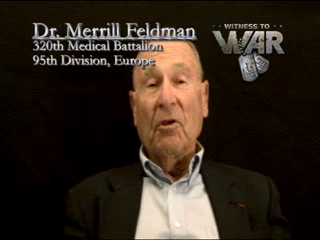2:38 | Dr. Feldman reflects back on leaving Boston Harbor, wondering if he'd ever see it again. He relives his trip on the USS West Point traveling through bombed out parts of Liverpool before landing on the beaches where D-Day occurred.
Keywords : Boston MA Atlantic Ocean U-boat Troopship

Dr. Merrill Feldman recalls being drafted into the Medic training program. He describes how the 95th division trained for the Pacific or North Africa, before unexpectedly landing in Europe.
Trained to mountain climb and lower wounded soldiers over cliffs while repelling, Dr. Feldman describes how many medics were needed on Europe's battlefields in 1943.
Dr. Feldman reflects back on leaving Boston Harbor, wondering if he'd ever see it again. He relives his trip on the USS West Point traveling through bombed out parts of Liverpool before landing on the beaches where D-Day occurred.
Trained to climb cargo nets and in top physical condition, Dr. Feldman describes his trip to Omaha Beach after D-Day. He recalls the shock of seeing a cemetery where American soldiers were buried.
Dr. Feldman describes how sleeping in crowded trains and "roughing it," toughened him up, making him a member of a "Band of Brothers." He shares how they came to the aid of General Patton.
In this dramatic account, Dr. Feldman describes how he faced heavy German resistance, losing half his battalion. He vividly recalls medically treating his badly injured comrades.
Trapped in a farmhouse as a medic, Dr. Feldman describes how he used German POW's to save the lives of three Americans, the horrific sight they all witnessed, and why he was awarded the Bronze Star.
Dr. Feldman vividly recalls defeating the German resistance, seizing strategic strongholds, and participating in victory parades. Now sixty years later he describes emotional reunions with those who survived.
Battling the cold and snow, Dr. Feldman tells the dramatic story of how the Germans were defeated, what it was like to cross the German border, and eventually end up in the "Battle of the Bulge."
Remembering the snowy fields of Germany, Dr. Feldman recalls suddenly coming upon a few dead Americans lying close to dozens of dead Germans. He describes what he thinks happened.
In a small Belgian town, Dr. Feldman rested with a young family. He describes them and then returning to battle to defeat the German troops.
In a dramatic account, Dr. Feldman remembers being assigned to the 2nd Armored Division, climbing on tanks while facing the Germans, and defeating them in and around the Ruhr Valley.
Dr. Feldman vividly recalls how the Americans barrelled through German towns and villages, thwarting the resistance of German citizens.
A shocking scene during World War II still sparks Dr. Merrill Feldman's memory. He describes seeing the first Messerschmidt jet plane and the rattling of machine gun fire pointed right at his battalion.
Recalling his first encounter with Hitler's SS troops, Dr. Merrill Feldman describes how he received the Silver Star and broke the rules of the Geneva Convention.
Wounded in battle, Dr. Feldman headed out of Germany to recover. He describes where he went and what happened to his injured hand.
Returning years later to a military cemetery in Normandy, Dr. Feldman remembers being unable to find the original grave markers. He shares how the site overwhelmed him and what the burial ground represents to humanity today.
In a dramatic account, Dr. Feldman recalls attacking the Germans at night which led to a loss of American lives. He describes what it took to overpower the German resistance and how it felt to be the only medic there.
Although he was a medic and a non-combatant, Dr. Feldman remembers bullets flying around him and the moment that he picked up a gun to lead an attack against the Germans.
A mass grave and emaciated prisoners are what Dr. Feldman witnessed when he helped liberate a concentration camp. Here he describes the anger he felt and how the Americans forced a German town to bury the dead.
Fighting intensely against the SS soldiers, Dr. Feldman narrowly escaped a German sniper. He describes how he got shot in the hand and why he received the Silver Star.
Twelve years after WWII, Dr. Feldman returned to Europe with his family. In this entertaining account, he describes a hero's welcome in Belgium and swapping stories with former enemy soldiers.
After the war, Dr. Feldman headed back to college. He shares how he ended up in Harvard Medical School with dozens of fellow soldiers and the wild times that followed.
Years after WWII, Dr. Feldman was honored for his services in France. He relives those moments and how as a Jew, he was honored at a new synagogue originally destroyed during the war.

The following are Merrill Feldman’s letters mostly to his father Alfred Feldman during his time in the Army during the Second World War.